
Devon is a ceremonial and non-metropolitan county in South West England. The most populous settlement in Devon is the city of Plymouth, followed by Devon's county town, the city of Exeter. Devon is a coastal county with cliffs and sandy beaches. Home to the largest open space in southern England, Dartmoor, the county is predominately rural and has a relatively low population density for an English county.
Princetown is a village located within Dartmoor national park in the English county of Devon. It is the principal settlement of the civil parish of Dartmoor Forest.

Tavistock is an ancient stannary and market town within West Devon, England. It is situated on the River Tavy from which its name derives. At the 2011 census the three electoral wards had a population of 13,028. It traces its recorded history back to at least 961 when Tavistock Abbey, whose ruins lie in the centre of the town, was founded. Its most famous son is Sir Francis Drake.
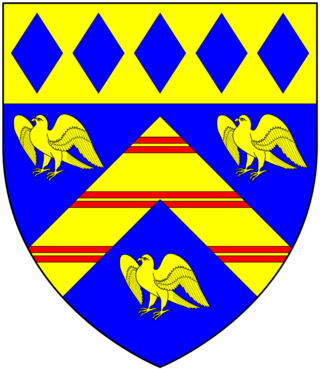
Baron Roborough, of Maristow in the County of Devon, is a title in the Peerage of the United Kingdom. It was created on 24 January 1938 for Sir Henry Lopes, 4th Baronet. He had earlier represented Grantham, Lincolnshire, in Parliament as a Conservative. The Baronetcy, of Maristow House in the County of Devon, had been created in the Baronetage of the United Kingdom on 1 November 1805 for Manasseh Masseh Lopes, a member of a wealthy family of Portuguese Jewish origin, with special remainder to his nephew Ralph Franco, son of his sister Maria. Manasseh Masseh Lopes converted to Christianity in 1802, and later represented Evesham, in Worcestershire, Barnstaple in Devon, and Westbury in Somerset, in Parliament. However, in 1819 he was twice convicted of bribing the voters in both Barnstaple and Grampound in order to be elected to Parliament, and was sentenced to imprisonment and heavy fines. He was also unseated by the House of Commons, but after his release from prison he nonetheless got elected for Westbury, a pocket borough which he controlled to a great extent.
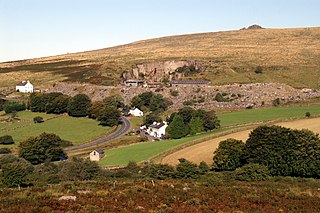
Merrivale is a locality in western Dartmoor, in the West Devon district of Devon, England. It is best known for the nearby series of Bronze Age megalithic monuments to the south and a former granite quarry.

The Great Thunderstorm of Widecombe-in-the-Moor in Dartmoor, Kingdom of England, took place on Sunday, 21 October 1638, when the church of St Pancras was apparently struck by ball lightning during a severe thunderstorm. An afternoon service was taking place at the time, and the building was packed with approximately 300 worshippers. Four of them were killed, around 60 injured, and the building severely damaged.

Yelverton is a large village on the south-western edge of Dartmoor, Devon, in England.
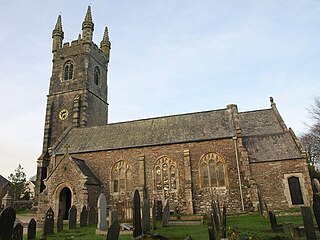
Bickleigh is a small village on the southern edge of Dartmoor in Devon, England. It has a population of about 50 people. It is in the South Hams district, and is about 7 miles (11 km) north of Plymouth city centre. The village is part of the electoral ward called Bickleigh and Shaugh. At the 2011 census the ward population was 4,723. 42 Commando is currently based at Bickleigh Barracks.

The South Devon and Tavistock Railway linked Plymouth with Tavistock in Devon; it opened in 1859. It was extended by the Launceston and South Devon Railway to Launceston, in Cornwall in 1865. It was a broad gauge line but from 1876 also carried the standard gauge trains of the London and South Western Railway between Lydford and Plymouth: a third rail was provided, making a mixed gauge. In 1892 the whole line was converted to standard gauge only.
Tavistock was the name of a parliamentary constituency in Devon between 1330 and 1974. Until 1885 it was a parliamentary borough, consisting solely of the town of Tavistock; it returned two Members of Parliament to the House of Commons of the Parliament of the United Kingdom until 1868, when its representation was reduced to one member. From 1885, the name was transferred to a single-member county constituency covering a much larger area.

Woolwell is a suburb on the north-east fringe of the city of Plymouth, England, located just outside the city's boundaries in the district of the South Hams. It is situated along the A386, close to the boundary of Dartmoor National Park, with good views of the surrounding landscape. Housing development began in Woolwell in 1981 and there is now a population of slightly over 3000. For an area of its size, it has a large number of facilities, including its own primary school, a medical centre and several shops.
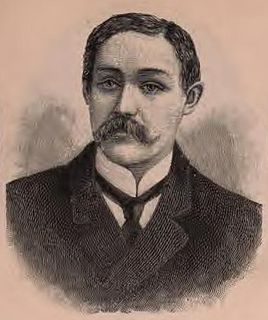
Henry Yarde Buller Lopes, 1st Baron Roborough, known as Sir Henry Lopes, 4th Baronet from 1908 to 1938, of Maristow in the parish of Tamerton Foliot, Devon, was a British Conservative Party politician.

The Exeter to Plymouth railway of the London and South Western Railway (LSWR) was the westernmost part of a route competing with that of the Great Western Railway (GWR) and its 'associated companies' from London and Exeter to Plymouth in Devon, England. Whereas the GWR route from Exeter followed the coast to Newton Abbot and then went around the southern edge of Dartmoor, the LSWR route followed the northern and western margins of Dartmoor, passing through the towns of Crediton, Okehampton, and Tavistock.
Hartley is a suburb of Plymouth in the county of Devon, England.

The A386 is a primary route in Devon, England. It runs from Plymouth on the south coast to Appledore on the north coast.

The Dartmoor crosses are a series of stone crosses found in Dartmoor National Park in the centre of Devon, England. Many of them are old navigational aids, needed because of the remoteness of the moorland and its typically bad weather. Some mark medieval routes between abbeys. Other crosses were erected as memorials, for prayer, as town or market crosses, in churchyards, and as boundary markers. The crosses were erected over a long period of time, some as recently as 100 years ago, the earliest probably almost 1,000 years ago.
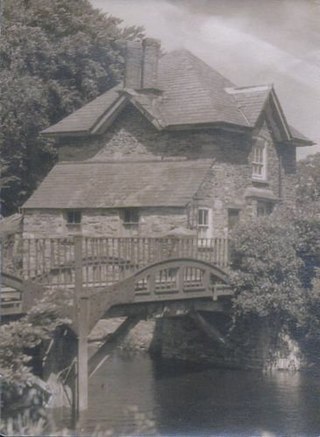
The Plymouth and Dartmoor Railway (P&DR) was a 4 ft 6 in gauge railway built to improve the economy of moorland areas around Princetown in Devon, England. Independent carriers operated horse-drawn wagons and paid the company a toll. It opened in 1823, and a number of short branches were built in the next few years.

The Princetown Railway was a 10¼ mile single track branch railway line in Devon, England, that ran from Yelverton on the Plymouth to Tavistock line, to Princetown via four intermediate stations, Dousland, Burrator and Sheepstor Halt, Ingra Tor Halt and King Tor Halt. The line closed in 1956 and today forms part of a popular cycling and walking route.
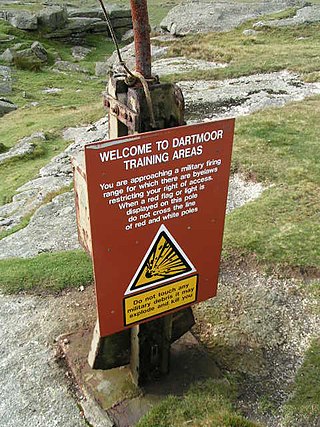
The Dartmoor Training Area (DTA) is a military training area on Dartmoor in Devon in southwest England. The area consists of approximately 13,000 hectares in the Dartmoor National Park.

















